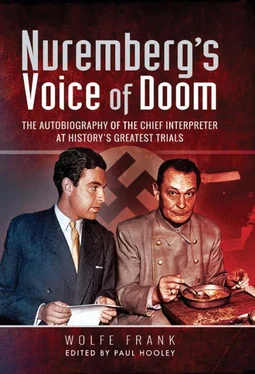There had been one other nasty experience, which she hesitated to relate for fear that it might embarrass me. When the US Army had appeared, they had robbed her of every item of value she had saved and cleaned her out of all she had in the little room in which she was surviving – and they had not been the least bit gentle with her. So the side on which I was serving had stolen, from a helpless old lady, some of my childhood souvenirs. It was one of the injustices of war and it got under my skin.
Months later I was escorting General Curtis LeMay, the top American Commander, through the courthouse in Nuremberg when I interrupted his praise of my performance as an interpreter. ‘General,’ I said, ‘I’m glad you were impressed. Now, could I ask you a favour?’ I told him about his gallant men’s conduct. He froze and handed me over to his adjutant – and that was the end of that, of course.
Mother had, however, succeeded in saving some pieces of antique furniture and a few pictures, by distributing them amongst some of her friends, and she had hidden a valuable china tea service; all of which she wanted me to take away with me. I could not do that of course, nor could I take mother with me. I was a British officer attached to the United States Army – so how could I turn up at Nuremberg with a German mother?
We had much to tell each other. This sort of reunion puts a great deal of emotional strain on two people who were very close and yet unable to be truly relaxed with each other. I had brought much suffering into her life through my flight from Germany and service for England and I couldn’t do anything conclusive to make up for it. (When I was later in a position to offer her a comfortable flat close to me she preferred to remain in a home for the elderly, waiting to get well enough to move into a place of her own; which never happened).
When I had to leave mother with her chickens the following morning she was in excellent spirits. My driver and I headed for Munich and I was wondering whether I would be as successful in locating my former wife Maditta. I need not have worried. As my Mercedes was bouncing over potholes and rubble I spotted her walking along a street – which I had no business taking and where she had no cause to be. She was recognisable to me from 300 yards away by her slightly knock-kneed and very typical walk.
I pulled up alongside her and rolled the window down. She noticed the private, my driver, sitting next to me, and she said in her perfect English – and here I will quote her verbatim: ‘Ah, there you are at last. I had expected you much earlier. Let’s go to the Conti (the Hotel Continental, only half destroyed, and just around the corner from where we were) and have a chat.’
I told my driver to pick me up from there later and we descended the steps to the air-raid shelter of the Conti which was a cafe in the morning and afternoon, a restaurant for lunch and dinner and a nightclub after 23.00 hours. It was amazingly elegant. The owner, Max Billig, had unearthed some of his own antique furniture, someone had done wonders with wrought iron grills and the place had an atmosphere of luxury which was completely unbelievable to one who had just been picking his way through rubble, ruins and bomb craters and over mountains of bricks and lumps of concrete. Munich had been truly bombed to hell, totally destroyed – Rotterdamned, Hamburgered, to quote some of the ghastly expressions that had been used in the British Press during the war. Perhaps the picture had shaken me all the more because I had lived some of the best years of my life in Munich and was still emotionally attached to the city. (Now that Munich has been most effectively reconstructed I find myself happily aglow and sentimentally affected whenever I go back there. Munich is one of very few places where many things are ‘as they used to be’).
Having settled down with Maditta to coffee and weinbrand (German firewater replacing Cognac) we went about the difficult business of discovering a common denominator for our talk. We had spent a whole war on opposite sides and nine years had passed since we had parted, so hurriedly, when I was running for my life. Events, experiences, impressions and emotions of colossal dimensions had rolled over us. We certainly were two strangers that morning but, as we were groping for a breakthrough in that strange atmosphere, we knew we would find some common ground.
During the two hours we spent talking we could do no more than lay the groundwork for future meetings. We very wisely stayed clear of any suggestion that we pick up where we left off. We were going to see each other again. Years of mind-boggling events could not be catalogued in two hours.
Maditta came to Nuremberg several times thereafter and I saw her in Munich often. However too much had happened to us. No matter how clearly we understood that we had gone through it all on opposite sides of the lines without being opponents, our emotions and feelings for each other had been affected. We had both had many lovers during the intervening years. That didn’t come between us; not in the least. What did matter, though, were the new gestures, the new expressions, the new actions and new behaviour that stemmed from those affairs – in other words the new and strange way of making love. None of this might have mattered without the impact of the war, we might have overcome its memories had we been able to go back to our emotional beginning. But it was too much and we finally admitted to it and parted the best of friends. Soon afterwards Maditta married a pre-war Canadian boy-friend and having been told, by German doctors, that she could never have children she presented him with no less than five. And they lived happily ever after.
How emotionally charged those two days had been, I reflected, as finally and irrevocably my driver and I resumed our journey. What, I wondered, was in store for me regarding my outrageous breach of discipline in leaving my assigned path to Nuremberg?
There were approving and disapproving looks when I eventually reported to the courthouse – The Palace of Justice – that afternoon. The approving ones came from those who knew of the mission to which I had assigned myself. The punishing glares came from the new faces that had arrived in Nuremberg together with my new CO, Colonel Hugh Turrell.
Amongst this new lot I discovered one Captain Wormser, a fat slob and a servile character I had known in the Pioneer Corps. He had tail-wagged his way into a promotion to major, which was due any day, and he was clearly miffed by the fact that there I was, promoted to a staff captain and in a fine regiment. Wormser took great pleasure in informing me that Colonel Turrell, who had gone to London for a few days, was only waiting to hear my story before court-martialling me.
Immediate action was called for. I did some asking around and discovered that the highest-ranking member of the British contingent at Nuremberg was Sir David Maxwell Fyfe. [2] Sir David Maxwell Fyfe (1900-1967) was a Member of Parliament, lawyer and judge who variously held the offices of Solicitor General, Attorney General, Home Secretary and Lord High Chancellor. He later became the Earl of Kilmuir. At Nuremberg he was Britain’s Deputy Chief Prosecutor and his cross-examination of Hermann Goering, which was translated by Wolfe Frank, is regarded as having been one of the most noted in history. At the time he was preparing to go underground in Soviet-occupied East Germany to write his ‘ Hangover After Hitler ’ series for the NYHT . Sir David wrote, ‘From my knowledge and daily experience of your performance as a most efficient and capable interpreter during the trial of the major Nazi War Criminals at Nuremberg, I know that you have a profound knowledge of the Nazi Background in Germany, both from the historical and the personal point of view.’
I made straight for his office. I had heard nothing but the highest praise for him whenever his name was mentioned. Formally, there was no excuse for what I had done, but perhaps Sir David would listen to the human aspect of my story. He did, and although he thought the matter was serious, he could see why I broke the rules to see my mother. He couldn’t and wouldn’t say what disciplinary action I would have to face, but he would have a word with the colonel when he returned to see if my obvious linguistic contribution to the task on hand could be maintained.
Читать дальше












